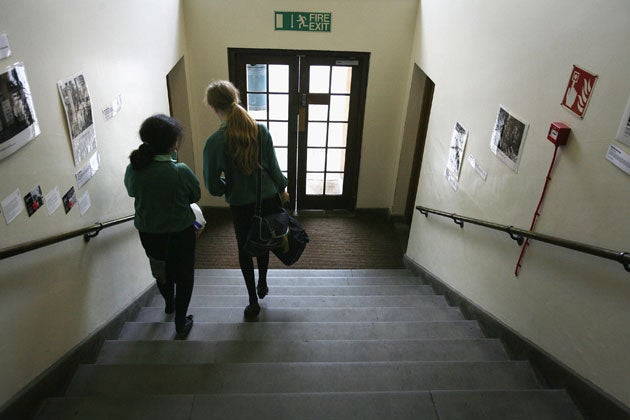State pupils lag far behind private peers in language GCSEs
Results at independent schools are five times better, amid new calls to make French compulsory again

Your support helps us to tell the story
From reproductive rights to climate change to Big Tech, The Independent is on the ground when the story is developing. Whether it's investigating the financials of Elon Musk's pro-Trump PAC or producing our latest documentary, 'The A Word', which shines a light on the American women fighting for reproductive rights, we know how important it is to parse out the facts from the messaging.
At such a critical moment in US history, we need reporters on the ground. Your donation allows us to keep sending journalists to speak to both sides of the story.
The Independent is trusted by Americans across the entire political spectrum. And unlike many other quality news outlets, we choose not to lock Americans out of our reporting and analysis with paywalls. We believe quality journalism should be available to everyone, paid for by those who can afford it.
Your support makes all the difference.Pupils at independent schools have five times as much chance of getting top A*-grade passes in French GCSE as those in the state sector, new figures reveal.
An analysis of GCSE results reveals a major divide between the performance of state and private schools. The figures show 30 per cent of youngsters in independent schools get an A* grade, compared with just 6 per cent in state schools – including selective grammar schools. The picture is similar for German (30 per cent in private schools and 7 per cent in state schools) and Spanish (35 per cent and 10 per cent respectively).
The comparisons emerge as a new row has flared up over the inexorable slide in the take-up of modern foreign languages at GCSE in all schools following the government decision to make them voluntary for 14 to 16-year-olds seven years ago.
French suffered a 6.6 percentage point drop in take-up this year and is now taken by only half the number that took the exam at the turn of the century. German, which fell by just over 4 percentage points, is in a similar state. The figures, based on an analysis of last year's results, were supplied in response to a parliamentary question from Nick Gibb, the Conservatives' schools spokesman.
"We cannot be satisfied with such vast disparity in attainment," he said.
"To close the gap we need a remorseless focus on raising expectations and we need schools to adopt the tried and tested approaches to teaching languages which have been shown to produce outstanding results time after time."
These would include more emphasis on grammar and punctuation and translation – cornerstones of modern language exams in the past.
The drop in take-up of foreign languages – which previous surveys by the Centre for Information on Language Teaching have shown have left the subjects with a high concentration of candidates from the private and selective state sector – has led many schools to axe, or scale down, their departments.
John Bangs, assistant secretary of the National Union of Teachers, called on the Government to revoke its decision to make the study of foreign languages voluntary.
"The continuing disastrous decline in take-up of modern foreign languages – particularly French – is as a result of a totally mistaken decision by the Government and a totally mistaken decision by the Conservative Party to support it.
"It is quite bizarre. The Government [must] review its policy on modern foreign languages. It is absolutely ludicrous that it is optional."
Meanwhile, exam board bosses were confident last night that ministers are about to give the green light for the IGCSE – a rival to the GCSE based on traditional O-level lines without coursework – to be used in state schools.
Many independent schools have switched to the exams – in particular for maths and science – but the state sector cannot receive funding to offer them because they do not follow the national curriculum.
Ann Puntis, chief executive of the University of Cambridge International Examinations, which provides IGCSEs to schools, said: "Indications are that we are now very close to receiving a final government decision on funding to enable state schools to offer the Cambridge IGCSE.
"Almost all of the syllabuses submitted have been approved in principle for funding."
Join our commenting forum
Join thought-provoking conversations, follow other Independent readers and see their replies
Comments